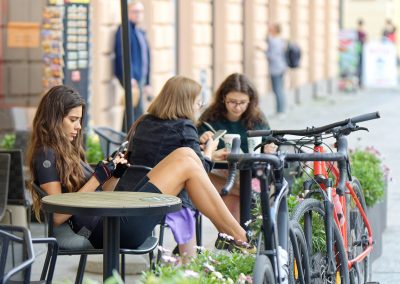The shocks we experienced in the last years, including COVID-19 pandemic and the Ukraine war, have accelerated the shift towards a more digital, mobile, and platform-dominated media landscape. But the complexity of current political, economic, and societal changes is not making people seek more information, rather making them run away from news.
According to Reuters Institute’s Digital News Report 2023, which surveyed about 93,000 individuals from 46 countries, fewer than half (48%) of people are very or extremely interested in news, down from 63% in 2017. The proportion of news avoiders remains close to 36% across geographies, many of them looking for selected topics only and skipping the big stories of the day, as they are perceived as repetitive or emotionally exhausting.
The Report confirms some of the media consumption trends we have already observed in the recent past: audience of traditional media such as printed newspapers and TV continues to fall, but online and social consumption are not making up the gap.
This is particularly true in Italy, where almost all national publications including Corriere della Sera and La Repubblica experience a shrinking circulation, and TV lost five points as a source of news (from 74% to 69%) in the last 10 years. Social media use for news is still more than double that of print and, together with online, is slightly more than television – but its figures are declining too. Facebook remains the most-used social platform for news, but it is facing the sharp competition of YouTube and youth-focused TikTok.
With family budgets suffering the inflation pressure, there are signs that the growth in online news payment may be levelling off. Across a basket of 20 richer countries, Reuters points out that only 17% of total users paid for online news – the same figure as last year. Norway has the highest quota of paying consumers (39%), Italy has 12%, while Japan (9%) and the United Kingdom (9%) are among the lowest.
Is the quality of free information so good to prevent news payment? Or are people dissatisfied with the media content they pay for? It may also be a question of trust. Reuters’ research tells overall trust in the news continues to fall, losing a further 2 percentage points in the last year to the current 40%. Finland is the country with the highest levels of trust (69%), while Greece has the lowest (19%). The figure is relatively low in Italy (34%), but there are high levels of trust in some specific news brands such as ANSA (78%) and Sky TG24 (71%).
About trust, the Digital News Report reveals an increasing skepticism for algorithms selecting news to be displayed via search engines, social media, and other online platforms. Less than a third (30%) of people say that having stories selected on the basis of previous consumption is a good way to get news, 6 percentage points lower than in 2016.
Worries about algorithms are part of a wider concern about how news is chosen and treated by journalists and media publishers, and how the economic and political power of single countries and governments can influence the global news network. Despite hopes that the internet could widen and boost the number of countries acting as sources of information, recent studies show a relevant imbalance in online news spreading.
A group of researchers from Sapienza University of Rome and University of Florence, Italy, coordinated by Professor Walter Quattrociocchi, analyzed about 140 million news articles from 183 countries, and found that there is a “tightly interconnected rich club” of news superspreaders.
Their findings [see “The Drivers of Global News Spreading Patterns”, May 2023] confirm that countries’ GDP is one of the main drivers to shape the worldwide news agenda, while other factors, including geographic proximity and cultural aspects like language, play a pivotal role in shaping the dynamics of news diffusion among nations.




